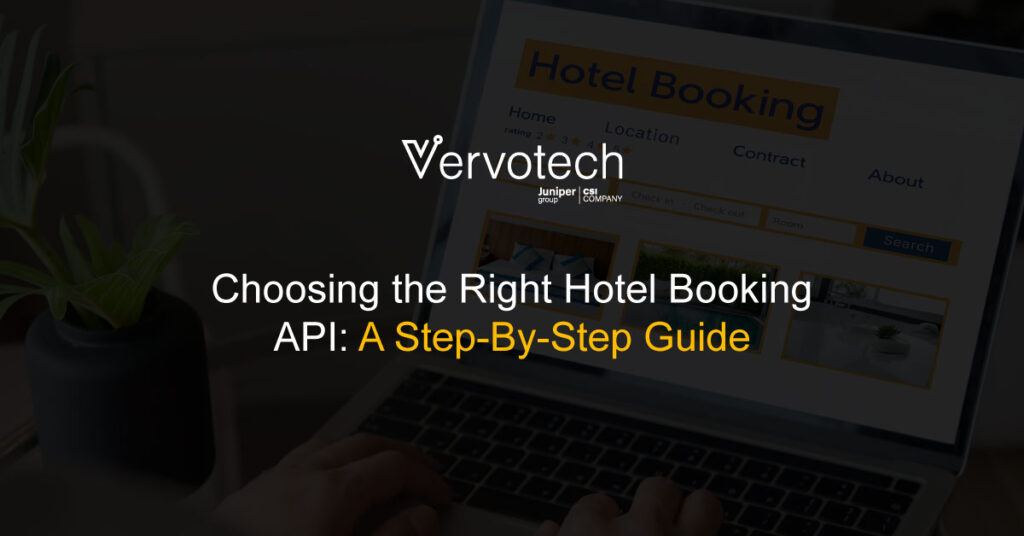If you run an OTA or you’re in the process of building one, you’re probably aware of the Hotel Booking API- the backbone that connects your platform to a large network of hotels, empowering you to deliver seamless booking experience.
Over 83% of travelers prefer using online platforms for booking accommodations, compelling travel booking platforms to offer seamless, reliable, and real-time hotel booking options to stay competitive.
This is why you need to ensure that you choose the right Hotel Booking API for your hotel booking platform.
However, not all APIs are created equal. From inventory diversity to integration flexibility, choosing the right API can make or break your business. The availability of choice in the market can understandably put you in a tough spot in the quest to find the right Hotel Booking API that fulfills all your needs at the right cost.
On the other hand, a bad choice of Hotel Booking API can hold you back from expanding your booking platform’s potential. We’ve put together this comprehensive step-by-step guide to help you select a Hotel Booking API that is the right choice for your business.
Let’s begin by understanding the factors that play a major role in selecting the right Hotel Booking API. Selecting the right Hotel Booking API is critical to ensuring your OTA operates efficiently, offers an exceptional user experience, and stays competitive. Here are the key factors to evaluate when making your decision:
1. Inventory and Coverage
Ensure the API gives access to a comprehensive inventory of hotels, including budget-friendly options, luxury properties, boutique hotels, and unique accommodations like villas or vacation rentals. This variety caters to diverse customer preferences and expands your appeal. Depending on your target market, verify whether the API provides international hotel listings or specializes in specific regions. For OTAs looking to expand globally, a broader inventory is a must.
2. Integration Flexibility
Check whether the API integrates easily with your existing systems, such as booking engines, CRM tools, or payment gateways. APIs with straightforward integration processes reduce development time and costs. Confirm that the API supports the programming languages and frameworks your development team uses. An API compatible with modern tools ensures a smoother implementation.
3.Real-Time Data Updates
Outdated information on room availability or pricing can lead to booking errors, customer dissatisfaction, and potential revenue loss. Choose an API that provides frequent and accurate updates to avoid these pitfalls. During peak travel seasons or promotional events, real-time updates become even more critical to ensure customers see the most up-to-date options.
4. Cost and Pricing Model
Assess the API provider’s fee structure, which could include setup costs, subscription fees, pay-per-use models, or commission-based charges. Opt for a model that aligns with your revenue strategy. Consider how the API will contribute to your bottom line. While some APIs might have higher costs, their features and performance could justify the investment by driving higher booking volumes.
Also read: Optimizing Your OTA for Retention and Profitability
5. API Performance
High uptime ensures your OTA can process bookings without interruptions, even during high traffic periods. A reliable API minimizes the risk of losing customers to competitors. Evaluate the API’s response time, as delays in loading hotel options or confirming bookings can frustrate users and lead to cart abandonment.
6. Customization and Features
Advanced filters, such as those for amenities (e.g., Wi-Fi, pools), location, and customer ratings, can enhance the user experience by allowing customers to find exactly what they’re looking for. Look for APIs that support dynamic pricing, enabling you to display competitive rates in real time. Features like promotions and upselling options (e.g., late check-out or breakfast deals) can increase revenue per booking.
7. Customer Support and Documentation
Ensure the provider offers timely support during the integration process and for any ongoing issues. Reliable support can prevent downtime and ensure a smooth customer experience. High-quality, well-organized API documentation makes it easier for your developers to understand, integrate, and troubleshoot the system efficiently.
8. Security and Compliance
The API should employ robust encryption and secure protocols (e.g., HTTPS) to protect customer information during transactions. Verify that the provider adheres to data privacy laws (e.g., GDPR for Europe, PCI DSS for payment security). Non-compliance can result in hefty fines and damage to your reputation.
9. Scalability and Futureproofing
Choose an API that can handle increased traffic and expanded hotel inventory as your business grows. Scalability ensures your OTA can meet future demand without major overhauls. APIs that regularly update their features and technology help you stay competitive in a rapidly evolving industry. Look for providers that are proactive in adopting new trends, such as AI-powered recommendations or voice search compatibility.
Now that you’ve taken a look at all the factors that impact the choice of your Hotel Booking API, let’s take a look at the 5 most popular ones.Are you looking to explore the latest Hotel Content Trends, Challenges & Solutions?
Get access to our smart guide to hotel content and learn how Vervotech’s AI solutions can help your business drive success.
Download Free eBook The table below compares different aspects of the five most popular Hotel Booking APIs that you can choose from:
| Feature | Expedia Rapid API | Hotelbeds API | Amadeus Hotel API | Booking.com API | Travelpayouts Hotel API |
| Overview | Access to a large global hotel network with powerful search and booking capabilities. | Offers an extensive selection of hotels worldwide, focused on wholesale distribution. | Global hotel booking API with integration into other travel services (flights, cars). | Provides comprehensive hotel inventory, real-time pricing, and booking capabilities. | Provides a wide range of hotels with access to real-time availability and commissions. |
| Inventory | Extensive global coverage with major chains and independent hotels. | Wide-ranging inventory of hotels, especially for bulk bookings. | Broad inventory, including both major hotel chains and smaller independent properties. | Access to millions of properties worldwide, focusing on independent hotels and boutique accommodations. | Access to a broad range of hotels globally, including large chains and smaller properties. |
| Integration | Simple API integration with detailed documentation. | Requires integration with Hotelbeds’ platform, ideal for wholesale bookings. | Easy integration with comprehensive documentation, especially for full-service travel platforms. | Straightforward integration with well-documented API guides and strong developer support. | Offers easy integration with a clean interface and real-time data. |
| Customization | Basic search filters with dynamic pricing and some customization options. | Limited customization but offers search and pricing features. | Highly customizable with filters like amenities, location, star rating, etc. | Provides some customization through search filters, room types, and pricing options. | Offers customizable search filters for accommodation types, amenities, and other preferences. |
| Cost Structure | Commission-based, varies depending on agreement. | Commission-based, fees depend on booking volume and agreements. | Pay-per-use or commission-based, pricing is flexible. | Commission-based, varies depending on the number of bookings made. | Commission-based, pay-per-booking or per-click options available. |
| Support | Dedicated support for larger OTAs, with a strong knowledge base. | 24/7 support with dedicated account managers for larger clients. | Extensive technical support and integration specialists available. | Comprehensive support system with detailed API guides and live chat assistance. | Offers detailed documentation and 24/7 customer support for integrations and technical issues. |
| Security | Meets GDPR, PCI DSS standards, and other relevant security measures. | Compliant with GDPR, PCI DSS, and secure payment protocols. | Adheres to PCI DSS and other industry security standards for transactions. | Strong security with compliance to GDPR, PCI DSS, and secure data protocols. | Implements SSL encryption and complies with PCI DSS for secure transactions. |
| Unique Features | Offers integration with flights, car rentals, and other travel services, enabling OTAs to provide a full-service travel solution. | Specializes in wholesale hotel bookings, catering primarily to B2B OTAs. | Integration across various travel services and deep customization options for large-scale OTAs. | Millions of properties with real-time availability and a focus on independent accommodations. | Offers flexible pricing models, including pay-per-click and per-booking commissions. |
So, that was the list! But how would you decide which API is right for your business? Do not worry, follow the steps mentioned in the next section to make the right decision. Related read: Choosing the Right Hotel Suppliers for Your OTA Related read: Choosing the Right Hotel Suppliers for Your OTA When evaluating a hotel booking API for your Online Travel Agency (OTA), it’s crucial to take a structured approach. Here’s a step-by-step breakdown to guide you through the process:
Step 1. Define Your Business Needs and Goals
Before you start evaluating APIs, it’s important to have a clear understanding of your business objectives. This will help you focus on the features that matter most for your OTA.
- Identify target market: Are you catering to luxury travelers, budget-conscious customers, or niche markets (e.g., vacation rentals)?
- Scalability: How do you envision your OTA growing? Will the API scale with your business as you expand?
- Integration requirements: What existing systems or platforms (CRM, payment systems, etc.) need to integrate with the API?
Step 2. Assess Inventory and Coverage
A robust hotel booking API should provide access to a wide variety of properties to meet diverse customer preferences.
- Global vs. Regional Reach: Does the API offer international listings or specialize in certain regions?
- Variety of properties: Ensure the API supports a broad range of hotels, from budget accommodations to luxury and unique properties like villas or boutique hotels.
- Real-time availability: Does the API provide live updates to prevent overbookings or pricing discrepancies?
Step 3. Evaluate Integration Flexibility
Smooth integration with your existing tech stack is crucial to ensure minimal disruption to your operations.
- Ease of integration: Does the API provide clear documentation for quick integration? Are SDKs, libraries, or plugins available to simplify the process?
- Compatibility: Ensure that the API supports the programming languages and frameworks your developers are using.
- Support for multiple platforms: Does the API offer integration across different devices (web, mobile, etc.)?
Step 4. Review Customization and Search Features
A hotel booking API should allow customization to tailor the user experience and offer features that boost booking conversions.
- Advanced search filters: Can customers filter results by amenities, location, star ratings, or room types?
- Dynamic pricing: Does the API support dynamic pricing based on demand, season, or promotions?
- Personalization: Does the API enable personalized recommendations based on customer behavior or preferences?
Step 5. Check for Cost and Pricing Models
Understand the financial implications of using the hotel booking API and how it aligns with your revenue model.
- Pricing structure: Is the pricing based on commissions, per booking, or a flat subscription fee?
- Transparency: Is the pricing structure clear, and are there any hidden fees (e.g., setup costs or transaction fees)?
- ROI analysis: Does the API help drive revenue growth or reduce operational costs, justifying the investment?
Step 6. Evaluate Performance and Reliability
Performance is key to delivering a smooth user experience and avoiding disruptions.
- Response time: How fast is the API when processing queries and displaying search results? Fast response times are essential for improving customer experience and preventing abandonment.
- Uptime guarantee: Does the API provider offer a service level agreement (SLA) that guarantees uptime? High uptime ensures your OTA operates without interruptions.
- Load handling: Can the API handle high traffic periods, especially during peak seasons or promotional events?
Step 7. Verify Security and Compliance
The security of customer data and compliance with industry regulations is a top priority.
- Data security: Does the API use encryption (e.g., SSL/TLS) to protect sensitive information like payment details?
- Compliance: Ensure that the API complies with relevant regulations like GDPR for data privacy and PCI DSS for secure payments.
- Fraud protection: Does the API provide mechanisms to prevent fraud or chargebacks?
Step 8. Consider Customer Support and Documentation
Support is essential for resolving any integration issues or operational challenges.
- 24/7 customer support: Does the API provider offer round-the-clock support via live chat, email, or phone?
- Technical assistance: Are there dedicated technical support channels to assist your development team during integration?
- Quality of documentation: Is the API documentation comprehensive, easy to follow, and regularly updated to reflect new features?
Step 9. Test and Evaluate the API
Once you’ve narrowed down your options, conduct thorough testing to evaluate how well the API meets your needs.
- Sandbox testing: Many API providers offer a sandbox or demo environment. Test the API with real data to see how well it performs under real-world conditions.
- Error handling: Review how the API handles errors or failures (e.g., what happens if a hotel booking fails or if there’s an availability issue).
- User experience: Ensure the API delivers a smooth, intuitive user experience for your customers, both in search and booking.
Step 10. Compare and Finalize Your Choice
After testing, compare the performance, features, costs, and overall fit of the APIs you’re considering. Make sure it aligns with your business goals and long-term plans.
- Cost-benefit analysis: Compare the value each API offers against its costs.
- Scalability and support: Ensure the API can grow with your business and that you can rely on customer support when needed.
- Vendor reputation: Look at customer reviews, case studies, or testimonials to assess the reliability and reputation of the API provider.
Step 11. Implement a Hotel Mapping Solution
Integrate a hotel mapping solution to ensure accuracy and standardization of hotel data from multiple sources. This step helps eliminate discrepancies like duplicate listings or inconsistent property details, enhancing data quality and user experience. Vervotech’s AI-powered Hotel Mapping solution provides precise, real-time mapping for seamless inventory management and superior booking efficiency. Also read: What is Hotel Mapping & Why It Matters for Your Online Travel Business Choosing the right hotel booking API is a key decision that can positively impact your OTA’s performance and customer satisfaction. Evaluating factors like inventory, integration capabilities, performance, and security can help you find a solution that aligns with your business goals. To further enhance your efficiency, consider integrating a hotel mapping solution to eliminate duplicate listings and maintain consistent property details.
Explore Vervotech’s AI-powered Hotel Mapping solution to ensure accurate, real-time data standardization, improve user experience, and streamline your booking process. Take the next step toward optimizing your OTA
Start a free trial Vervotech is a leading Hotel Mapping and Room Mapping API that leverages the power of AI and ML to quickly and accurately identify each property listing through the verification of multiple parameters. With One of the industry’s best coverage of 98% and an accuracy of 99.999%, Vervotech is quickly becoming the mapping software of choice for all leading global companies operating in the travel and hospitality industry. To learn more about Vervotech and the ways it can enhance your business in the long run contact us: sales@vervotech.com








